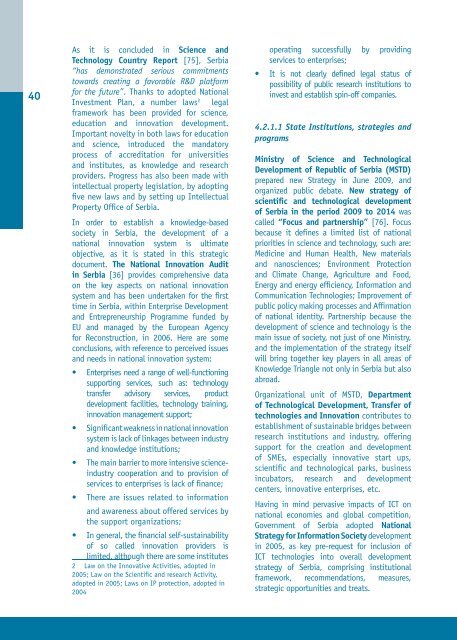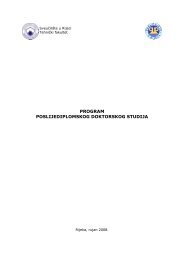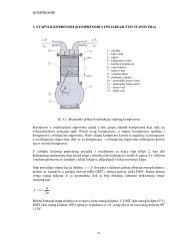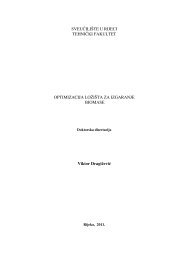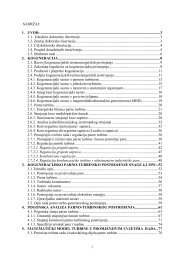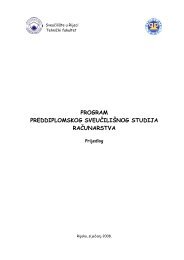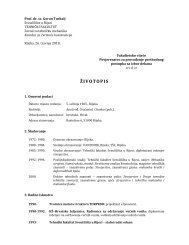universityâenterprise cooperation
universityâenterprise cooperation
universityâenterprise cooperation
You also want an ePaper? Increase the reach of your titles
YUMPU automatically turns print PDFs into web optimized ePapers that Google loves.
40<br />
As it is concluded in Science and<br />
Technology Country Report [75], Serbia<br />
“has demonstrated serious commitments<br />
towards creating a favorable R&D platform<br />
for the future”. Thanks to adopted National<br />
Investment Plan, a number laws 2 legal<br />
framework has been provided for science,<br />
education and innovation development.<br />
Important novelty in both laws for education<br />
and science, introduced the mandatory<br />
process of accreditation for universities<br />
and institutes, as knowledge and research<br />
providers. Progress has also been made with<br />
intellectual property legislation, by adopting<br />
five new laws and by setting up Intellectual<br />
Property Office of Serbia.<br />
In order to establish a knowledge-based<br />
society in Serbia, the development of a<br />
national innovation system is ultimate<br />
objective, as it is stated in this strategic<br />
document. The National Innovation Audit<br />
in Serbia [36] provides comprehensive data<br />
on the key aspects on national innovation<br />
system and has been undertaken for the first<br />
time in Serbia, within Enterprise Development<br />
and Entrepreneurship Programme funded by<br />
EU and managed by the European Agency<br />
for Reconstruction, in 2006. Here are some<br />
conclusions, with reference to perceived issues<br />
and needs in national innovation system:<br />
• Enterprises need a range of well-functioning<br />
supporting services, such as: technology<br />
transfer advisory services, product<br />
development facilities, technology training,<br />
innovation management support;<br />
• Significant weakness in national innovation<br />
system is lack of linkages between industry<br />
and knowledge institutions;<br />
• The main barrier to more intensive scienceindustry<br />
<strong>cooperation</strong> and to provision of<br />
services to enterprises is lack of finance;<br />
• There are issues related to information<br />
and awareness about offered services by<br />
the support organizations;<br />
• In general, the financial self-sustainability<br />
of so called innovation providers is<br />
limited, although there are some institutes<br />
2 Law on the Innovative Activities, adopted in<br />
2005; Law on the Scientific and research Activity,<br />
adopted in 2005; Laws on IP protection, adopted in<br />
2004<br />
operating successfully by providing<br />
services to enterprises;<br />
• It is not clearly defined legal status of<br />
possibility of public research institutions to<br />
invest and establish spin-off companies.<br />
4.2.1.1 State Institutions, strategies and<br />
programs<br />
Ministry of Science and Technological<br />
Development of Republic of Serbia (MSTD)<br />
prepared new Strategy in June 2009, and<br />
organized public debate. New strategy of<br />
scientific and technological development<br />
of Serbia in the period 2009 to 2014 was<br />
called “Focus and partnership” [76]. Focus<br />
because it defines a limited list of national<br />
priorities in science and technology, such are:<br />
Medicine and Human Health, New materials<br />
and nanosciences; Environment Protection<br />
and Climate Change, Agriculture and Food,<br />
Energy and energy efficiency, Information and<br />
Communication Technologies; Improvement of<br />
public policy making processes and Affirmation<br />
of national identity. Partnership because the<br />
development of science and technology is the<br />
main issue of society, not just of one Ministry,<br />
and the implementation of the strategy itself<br />
will bring together key players in all areas of<br />
Knowledge Triangle not only in Serbia but also<br />
abroad.<br />
Organizational unit of MSTD, Department<br />
of Technological Development, Transfer of<br />
technologies and Innovation contributes to<br />
establishment of sustainable bridges between<br />
research institutions and industry, offering<br />
support for the creation and development<br />
of SMEs, especially innovative start ups,<br />
scientific and technological parks, business<br />
incubators, research and development<br />
centers, innovative enterprises, etc.<br />
Having in mind pervasive impacts of ICT on<br />
national economies and global competition,<br />
Government of Serbia adopted National<br />
Strategy for Information Society development<br />
in 2005, as key pre-request for inclusion of<br />
ICT technologies into overall development<br />
strategy of Serbia, comprising institutional<br />
framework, recommendations, measures,<br />
strategic opportunities and treats.


